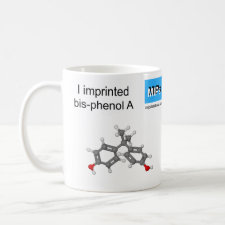
Authors: Zhang H, Yao RQ, Wang N, Liang RN, Qin W
Article Title: Soluble Molecularly Imprinted Polymer-Based Potentiometric Sensor for Determination of Bisphenol AF.
Publication date: 2018
Journal: Analytical Chemistry
Volume: 90
Issue: (1)
Page numbers: 657-662.
DOI: 10.1021/acs.analchem.7b03432
Abstract: Molecularly imprinted polymer (MIP)-based polymeric membrane potentiometric sensors have been successfully developed for determination of organic compounds in their ionic and neutral forms. However, most of the MIP receptors in potentiometric sensors developed so far are insoluble and cannot be well dissolved in the polymeric membranes. The heterogeneous molecular recognitions between the analytes and MIPs in the membranes are inefficient due to the less available binding sites of the MIPs. Herein we describe a novel polymeric membrane potentiometric sensor using a soluble MIP (s-MIP) as a receptor. The s-MIP is synthesized by the swelling of the traditional MIP at a high temperature. The obtained MIP can be dissolved in the plasticized polymeric membrane for homogeneous binding of the imprinted polymer to the target molecules. By using neutral bisphenol AF as a model, the proposed method exhibits an improved sensitivity compared to the conventional MIP-based sensor with a lower detection limit of 60 nM. Moreover, the present sensor exhibits an excellent selectivity over other phenols. We believe that s-MIPs can provide an appealing substitute for the traditional insoluble MIP receptors in the development of polymeric membrane-based electrochemical and optical sensors
Template and target information: bisphenol AF



Join the Society for Molecular Imprinting

New items RSS feed
Sign-up for e-mail updates:
Choose between receiving an occasional newsletter or more frequent e-mail alerts.
Click here to go to the sign-up page.
Is your name elemental or peptidic? Enter your name and find out by clicking either of the buttons below!
Other products you may like:
 MIPdatabase
MIPdatabase









